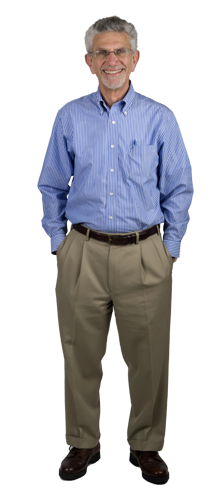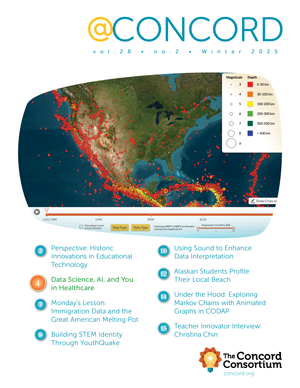Innovator Interview: Andy Zucker
 Q. Tell us about your background.
Q. Tell us about your background.
A. I grew up in Manhattan in an apartment building near the American Museum of Natural History. My father was an internist and psychiatrist and my mother was a world expert on platelets and blood clotting, so I was surrounded by science early. I became interested in computers in high school, and started programming with punch cards. After college, I became a math and science teacher, and I directed the computer center at Milton Academy— before there were microcomputers. I then earned a master’s in science education from Stanford and a doctorate from the Harvard Graduate School of Education.
Q. Can you describe your career.
A. I’ve had the opportunity to play many different roles in education—from strategic planning to program evaluation to video and software development. As a Fellow in the Education Policy Fellowship Program, I administered federal grants for novel uses of telecommunications in health, education and welfare. At the U.S. Department of Education, I wrote congressional budget justifications. My bailiwick included children’s TV, so I got to know Frank Withrow, one of the fathers of Sesame Street, and I became a huge supporter of children’s television.
Later, I worked at SRI International for 17 years, almost always in the Arlington, Virginia, office. SRI is a fascinating place—with 25,000 projects over the years, they’ve done everything from helping Walt Disney decide where to put Disneyland to creating Tide, the first artificial detergent, as well as developing speech recognition software and Siri, the iPhone assistant.
Q. Tell us about your book Transforming Schools with Technology.
A. Larry Cuban was a vocal and often thoughtful critic of computers in school. And for a time there was not enough pushback that technology was important, so I wrote Transforming Schools with Technology. I always felt that having been a teacher was incredibly important to all the other things I did because I learned some of the ground truth about what it is to be a teacher. One myth I was fighting in the book was then fairly common: that teachers resist technology. That’s not true.
Q. What are your thoughts on the evolution of 1:1 programs?
A. Never Mind the Laptops is the title of one book about laptop schools. The technology enables other things and it’s the other things that count. The price of computers keeps coming down, so it’s inevitable we’ll get to 1:1. But getting computers in schools is slower than everyone had wished. Social institutions are slow. Technology is fast. That’s the story of the world’s big problems in a nutshell.
Q. What are some of your hobbies?
A. I’m trying to shift gears as I approach retirement. I’ve been working with the Greater Boston Interfaith Organization, which is working to control health care costs in Massachusetts, and I’m interested in what psychology means for public policy. My wife and I also love movies, theater and music.
Q. What makes the Concord Consortium special?
A. The Concord Consortium has been a wonderful place to be for the past eight years. One of the great strengths is teamwork, which is key for innovation. Thomas Edison was not alone; he had a staff of 30. That’s the way it’s done!
Q. What projects are you working on?
A. Our team has been developing SmartGraphs, which is web-based software designed to help students understand graphs and the STEM concepts represented in graphs (such as velocity or population growth). We also developed an online authoring system for non-programmers to create and publish new activities. We’d love to see SmartGraphs get used very widely.
